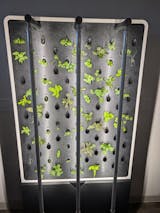We at Just Vertical are often asked about organic produce: what does it mean? What are the benefits? Is what you grow at home organic? With this article you can find answers to all those questions and more.
What Does Organic Mean by Definition?
It seems like everyone wants to buy organic, some citing health reasons, others environmental. Some just because they can. But what does organic really mean?
In a technical sense, in Canada to be certified organic the grower must follow the organic production systems general principals and management standards as well as using the organic production systems permitted substances list.
The overall goal of these standards and lists is to promote agriculture that focuses on the entire ecosystem including: soil, plants, livestock, people, and insects. Not just crop yields. This goal to build a sustainable operation is a noble one.
Additionally, for new farmers there may be a waiting period, whereby a farmer must not have used any banned substances on the soil over the past 3 years.
What do People Think Organic Means?
People surveyed cite all kinds of reasons for buying organic with varying levels of truthfulness. The most commonly cited reason is the lack of pesticides.
People buying under the assumption of less pesticides are correct and there have been found to be lower residual levels of pesticides in organic produce than conventional produce. This doesn’t mean there are no pesticides in organic produce it just means the pesticides used come from the permitted substances list. It should be noted that all produce on the shelves is monitored for pesticides and follows health and safety standards set by the government.
|
Building organic farms or conventional we make sure our customers get the cleanest and safest setup |
Some people buy organic for the perceived nutritional benefits. Unfortunately, scientific evidence on this has been mixed with meta analysis of the hundreds of studies done coming back as having inconclusive results. Though one of the goals of organic agriculture, maintaining nutrient rich growing conditions, should enhance the nutrition of the food there are many other factors that play into the nutritional benefits of food such as transportation times and freshness. |
Finally, an oft cited reason for buying organic food is the taste factor. Some people swear organic produce tastes better or different than conventional produce. This however simply comes down to a matter of preferences. You do you!
Is What I Grow at Home Organic?
This is a question we often get asked. The best answer is simply it can be if you want it to be. If you were so inclined, you could go and get your production methods certified as organic if you are following all the guidelines. We don’t use GMO’s or any disqualifying product in any of our packages or grow operations.
Or if you are like most people growing at home you can simply follow the guidelines yourself and if the food is not being sold you can happily feed your family with your organically practicing home garden.
When we really get into the question of organic at home we prefer to ask the question of why someone wants to grow organically. From there we can frame the answer much better. If they want less pesticides used well then this is perfect as we don’t use any pesticides at all. Do they want it taste better? Then this is perfect because nothing adds to the taste like having fresh produce.
The bottom line is home growing, whether it is certified organic or not, can be a great way to get the benefits of organics without the long-term costs.
Alternatives to Organic, How Can It be Improved?
Now here is where we can get philosophical and ponder about the state of agriculture. What would a better future look like. Well first off would be more transparency in the supply chain. Organic has become a large label now that many products fall under. There can be incredibly sustainable bio-dynamic farms that go above and beyond the required norms and then there are farms that barely manage to obtain the organic certification. Should these two farms be treated equally in the eyes of the consumer?
This begs the question of whether there is a better certification system. Should there be a system with levels to it? Should the base standards should simply be set higher?
| Second, would be consumer knowledge and an audit of what currently exists in the written literature. Unfortunately, in the age of the internet there is a lot of misunderstanding, misrepresentation, and opinion pieces written on organics and agriculture in general that can confuse people more than help them. These misconceptions are especially strong around how a typical farm usually operates, family farms are the most common type of farm while the scary ‘big corporate multi-national factory farm’ is rare in the produce world (extra tip: many family farms are registered as corporations for tax and legal reasons now). GMO’s are also a frequently misunderstood topic that gets the wrong kind of attention, many GMO products were invented with the intent to help not harm farmers, what goes into them is widely misconstrued as well. Something like Bt (Bacillus thuringiensis) is a permitted substance on the organic list to be used but is demonized in a GMO application like Bt corn. |
If you had your own indoor garden you would be smiling too! |
At the end of the day what we like to emphasize is that agriculture, especially non-livestock agriculture, has come a long way and has managed to feed an ever-growing population. There is still a long way to go to build a truly sustainable global agricultural system. The single best thing you can do to help get there is getting to know your farmer, or even better grow some of your own food yourself!
Sources and further reading:
http://laws-lois.justice.gc.ca/eng/regulations/SOR-2009-176/
https://www.cog.ca/home/about-organics/the-canadian-organic-standards/#1529347543198-5f2ea4e7-8499
https://www.cog.ca/home/about-organics/faqs/consumers/#1504022326059-d2a0b007-cb35
http://www.publications.gc.ca/site/eng/9.854645/publication.html
https://www.pccmarkets.com/sound-consumer/2017-05/should-hydroponic-produce-be-certified-organic/
https://lifehacker.com/5941881/what-does-organic-really-mean-and-should-i-buy-it
http://www.summertomato.com/organic-versus-conventional-food
https://www.usda.gov/media/blog/2012/03/22/organic-101-what-usda-organic-label-means



